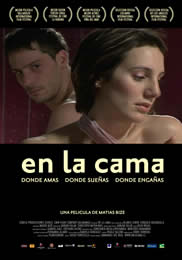 Two strangers having sex in a motel; they introduce themselves afterwards and begin talking—telling truths and lies. Matías Bize’s comedic and risqué film focuses on the lives of newly formed couple Daniela (Blanca Lewin) and Bruno (Gonzalo Valenzuela) and manages to include gripping drama and crowd-pleasing emotion into a small motel room. En la Cama is a fresh look at the vast distance between the sexes and the relationship between the two.
Two strangers having sex in a motel; they introduce themselves afterwards and begin talking—telling truths and lies. Matías Bize’s comedic and risqué film focuses on the lives of newly formed couple Daniela (Blanca Lewin) and Bruno (Gonzalo Valenzuela) and manages to include gripping drama and crowd-pleasing emotion into a small motel room. En la Cama is a fresh look at the vast distance between the sexes and the relationship between the two.
Matias Bize, Didector of En la Cama was born in Santiago, Chile in 1979. Just before graduating from the “Escuela de Cine de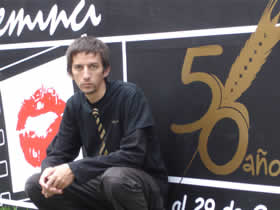 Chile”, with only 23 years old, he directed his first film, Sabado (Saturday) witch was premiered in “Mannheim-heidelberg International Film Festival” . There he won 4 awards including the “Rainer Fassbinder Prize”. Saturday brought him several awards and made him able to direct his second film En la Cama (In Bed). In Bed has already won more than thirty awards.
Chile”, with only 23 years old, he directed his first film, Sabado (Saturday) witch was premiered in “Mannheim-heidelberg International Film Festival” . There he won 4 awards including the “Rainer Fassbinder Prize”. Saturday brought him several awards and made him able to direct his second film En la Cama (In Bed). In Bed has already won more than thirty awards.
Bijan Tehrani: What inspired you to make “En la cama“?
Matías Bize: First, the inspiration came from the challenge of making a movie with the most basic elements. I wanted to see if I was able to shoot a movie with only two characters in one location during one night; and second, I wanted to focus on relevant elements for the story of “En la cama”. In these few hours in which the characters share a hotel room to have sex, the movie shows what happens with their deeper feelings which is the most important thing. That is definitely very inspiring for me.
 Bijan: Your movie has a close look at love and intimate human relationship. How did you manage to re-create such a precise level of reality? I doubt that you followed the script without any improvisation?
Bijan: Your movie has a close look at love and intimate human relationship. How did you manage to re-create such a precise level of reality? I doubt that you followed the script without any improvisation?
Matias: That was my aim when I was shooting “En la cama”: to tell what happens with two real people who go to a hotel only to have sex and what happens during that night in their intimate moment. I recreated reality working very hard on the script. We developed the script very close to how we really speak. Improvisation was part of the rehearsals. We did a lot of improvisation during the rehearsals to try new things. After these improvisations we  re-wrote parts of the script and so on. It was a six-month process. But during the shooting we followed the script. We allowed only a few improvisations. For me silence in “En la cama” is even more important than the dialogues because it is revealing a lot of other feelings that words can’t express. Silence is part of a real conversation and of a real relationship.
re-wrote parts of the script and so on. It was a six-month process. But during the shooting we followed the script. We allowed only a few improvisations. For me silence in “En la cama” is even more important than the dialogues because it is revealing a lot of other feelings that words can’t express. Silence is part of a real conversation and of a real relationship.
Bijan: How actively your actors were involved in creation of en la cama? Did they have to only follow your guidance? 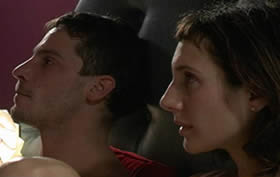 Matias: The actors were indeed quite involved in the creative process of “En la cama”. I wanted to work with lots of freedom and the rehearsals helped a lot in discovering what the movie actually was. I didn’t want to work with a fixed idea beforehand. The actors had a lot of room to work their characters out and to try a lot of ideas without being afraid of trying them during the process. In this sense they contributed a lot allowing magic moments to appear. The intensive rehearsals didn’t aim at fixing things up but they aimed at favoring the film to appear and to bloom in time.
Matias: The actors were indeed quite involved in the creative process of “En la cama”. I wanted to work with lots of freedom and the rehearsals helped a lot in discovering what the movie actually was. I didn’t want to work with a fixed idea beforehand. The actors had a lot of room to work their characters out and to try a lot of ideas without being afraid of trying them during the process. In this sense they contributed a lot allowing magic moments to appear. The intensive rehearsals didn’t aim at fixing things up but they aimed at favoring the film to appear and to bloom in time.
Bijan: Daniela and Bruno get to know more about each other through the night, did the actors bring any of their 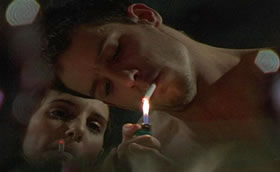 own life experiences into the movie? Were any of the dialogues from the actors?
own life experiences into the movie? Were any of the dialogues from the actors?
Matias: Yes, there’s a certain level of life experience involved in the performance of the actors in “En la cama” because the story is very close to anybody’s experience. The actors felt very close to the situation of the script and how we worked it out. We shot the movie in the chronological order of the script and all of the dramatic load that the actors and the crew acquired during the shooting helped in the performance of the actors at the end of the movie because the actors had gained a deeper intimacy throughout. Since we did this chronological shooting of the film, the end of the story matched the end of the shooting so everybody in the crew and the actors were crying because it was the end of a very intense process and also because it was the end of a love story.
 Bijan: How did you choose your actors for en la cama?
Bijan: How did you choose your actors for en la cama?
Matias: I needed very good actors who could be deeply involved in the project also. I had worked with Blanca Lewin before in my previous movie so the script was written thinking of her. I had seen Gonzalo Valenzuela working in other projects and I knew he could do the character very well. They have received many awards and very good criticism for this movie. I am very thankful and happy to have worked with them in “En la cama” because I think they enriched the movie a lot.
Bijan: Daniela and Bruno find love at dawn, but then they leave each other, is it because you don’t see any future for love? Is this a problem of our time?
Matias: I hope it’s not the end of love in our time. But I’d like to leave the question open for debate. I wanted to allow people question themselves about love,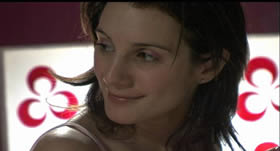 relationships and their lives after they had seen the movie. I think that’s the reason why the movie has worked so well and is so provocative, because it obliges you to think and analyze yourself. I don’t want to give answers I want to propose questions.
relationships and their lives after they had seen the movie. I think that’s the reason why the movie has worked so well and is so provocative, because it obliges you to think and analyze yourself. I don’t want to give answers I want to propose questions.
Bijan: A film critic, a friend of mine, was calling “En la cama”, a political movie. He was saying the movie is about the individualism in Chile today. Kind of people escaping from politics. What do you say to that?
Matias: It’s surprising and funny to have people’s interpretations of the movie. A Bolivian director said that “En la cama” was the history of Chile. Well, interpretations can take any direction and it’s up to the people to make them. The important thing for me is that people get feelings and ideas, say political or historical or even simpler, out of “En la cama” and that the movie encourages them to think about their own lives.
 Bijan. How did you come up with the visual style of En la Cama?
Bijan. How did you come up with the visual style of En la Cama?
Matias: This was another very important challenge for me because it was easy to fall in the format of a traditional play. We did a hard work to achieve a powerful cinematographic visual style and I think it was worth it. At the beginning of the movie the characters don’t know each other and they have a superficial relationship so the camera behaves similar to the characters in the situation. The editing in this part is very fast with the camera showing a lot of perspectives and angles, but as the characters start relating in a deeper way, the takes are longer and concentrate on the expressions of the characters, the camera slows down and focuses more on the story and what happens inside them.
Bijan: What are your plans for international distribution of “En la cama”?
Matias: I am very proud and happy how people are reacting towards the movie all over the world. The movie has received about 30 international awards and a lot of international acclaim and that has surprised me a lot. “En la cama” has been sold worldwide and people like it quite much, both critics and audience. I’ve been very lucky to have travelled to many countries to present the movie in International film festivals and in premieres and I’ve seen how people enjoy the movie. I think the reason why the movie is going so well is because people get touched by the story of “En la Cama”.
Bijan: What did lead you to become a filmmaker?
Matias: My parents are both architects and I had a very artistic education. I knew I didn’t want to be sitting in an office doing a boring job for me. But I don’t  have “the typical filmmaker story” because no one gave a camera to me when I was a child and I preferred by far playing foot-ball than going to watch the movies. But when I was finishing school and I had to make up my mind about what I was going to do in the future, something happened. One night I met a friend of mine who studied cinema abroad and we were on the street having a beer and talking. He told me about the career and what it was like to study it and I liked the idea very much. I thought “Well, why don’t I study the same?” while I was thinking that, policemen arrived to take us to the police station with them because drinking alcohol on the street is not permitted in my country. From that moment on I knew cinema was going to be my life.
have “the typical filmmaker story” because no one gave a camera to me when I was a child and I preferred by far playing foot-ball than going to watch the movies. But when I was finishing school and I had to make up my mind about what I was going to do in the future, something happened. One night I met a friend of mine who studied cinema abroad and we were on the street having a beer and talking. He told me about the career and what it was like to study it and I liked the idea very much. I thought “Well, why don’t I study the same?” while I was thinking that, policemen arrived to take us to the police station with them because drinking alcohol on the street is not permitted in my country. From that moment on I knew cinema was going to be my life.
Bijan: Who are the filmmakers that you admire?
Matias: There are several filmmakers that I admire very much who have contributed in one way or another to my movies. I always prefer independent movies rather than big productions or historical movies. I like simple but touching movies. I can name some of these filmmakers that I admire a lot: Paul Thomas Anderson,
Jim Jarmusch, Sofia Coppola, Richard Linklater, Gus Van Sant, and Lars von Trier to name a few.
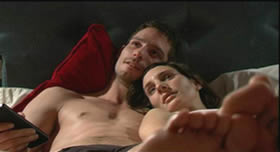 Bijan: Please tell us about your future projects.
Bijan: Please tell us about your future projects.
Matias: I’m finishing my new movie called “Lo bueno de llorar” (“About crying”). It’s a story about a couple splitting up during one night in the streets of Barcelona.
It shows a very difficult moment in the separation of a couple that actually love each other very much. They walk about Barcelona until dawn. They think about the relationship and their future. I believe everybody has experienced something like that so I am pretty sure people will feel identified with the story and get touched by it. I was lucky to have had a very good script, very talented actors and a very strong story behind.
Bijan: Thank you for your time!
